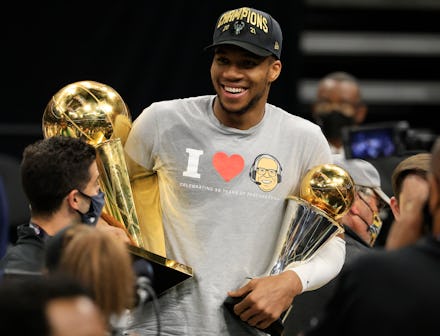How Giannis Antetokounmpo shattered the stereotype of the asshole superstar

Toward the end of the seventh episode of last year’s hit documentary series The Last Dance, Michael Jordan considers the question of whether or not his infamous intensity came at the expense of being perceived as a “nice guy.” “When people see this, they gonna say, ‘He wasn’t really a nice guy. He may have been a tyrant.’ Well, that’s you, because you never won anything,” Jordan says. “I wanted to win.” Then, in one of the most striking moments from the series, Jordan becomes suddenly unguarded. “That’s how I played the game. That was my mentality,” he says, before his eyes suddenly well up, and he begins to tremble. "If you don’t want to play that way, don’t play that way.”
Jordan himself seemed to have been taken aback by his emotions, but it is perhaps because he is confronted with a tragic understanding. “He couldn’t have been nice,” teammate B.J. Armstrong says earlier. “With that kind of mentality he had, he can’t be a nice guy.” Throughout this sequence, one might think of the iconic clip of Jordan, utterly spent, crying as he rests his head on his first ever Finals Trophy after his 1991 championship win. For Michael Jordan, winning at all costs meant it was necessary to forgo being a certain type of person — in his vision, in the mold that he single-handedly popularized, one could not worry about being an asshole if you are determined to be the best.
Last night, Giannis Antetoukounnmpo had his own emotional first-championship moment. Minutes after leading the Milwaukee Bucks to victory in the NBA Finals, he collapsed on a chair at the edge of the court, looking around the raucous Fiserv Forum, tears streaming down his face. He was also an exhausted champion, putting up 50 points (tying the record for the most in a closeout game) and essentially strong-arming his way to Milwaukee’s first basketball title in 50 years. But throughout these Finals the larger cultural narrative around Antetoukounmpo has been a far cry from the typical Jordan-esque paradigm of the winner as a single-minded, imperious character.
Instead, the internet seems to have collectively agreed that while being an inhuman force on the court — logging what is already being considered among the greatest Finals performances in NBA history — he is somehow also among the most likable athletes out there. Videos and tweets have circulated — treating an adoring young fan with tenderness; his viral tweet about his discovery of smoothies; both his dad jokes and teenage-level sexual innuendos — of him, alternating between a child-like goofiness and his earnest kindness as a human. Just this morning, he was trending for ordering 50 chicken nuggets, in honor of his 50-point performance, along with a large half Sprite-half lemonade in a Chick-Fil-A drive-thru while on his Instagram Live.
Now, officially sitting on basketball’s mountaintop, Antetoukounmpo seems to have gotten there while being that unlikely thing for the once-in-a-generation superstar: a nice, fun-loving person. This is only reinforced by the 26-year-old’s fairytale come-up. He didn’t start playing basketball until late into his childhood — most of that time was spent hawking goods on the street with his brother to help feed their family in Athens, Greece, where Antetoukounmpo was born after his parents immigrated from Nigeria. Early in his career, after traveling to an ATM on a game day to send all the money in his pocket back home, Antetokounmpo, without a vehicle and insecure about bothering anyone on the team for help, began to run back to stadium, before fans eventually spotted him on the road and drove him to the game.
That humility seems to have remained, while the mentality of relentlessness it takes to win has only grown (just before his historic-level Finals performances, Antetoukounmpo seemed to have ruined his knee in a scary injury in the previous round, only to return to the court days later, seemingly stronger than ever). Many athletes have done well at rising into greatness by following Jordan’s version of being — Kobe and his Mamba Mentality, of course, being the most well-known strain of that brand of almost-psychotic dedication to winning. (Some have also not followed that blueprint, from Tim Duncan to Steph Curry to even LeBron James.) And it’s easy to knock this vision of the game, of playing “that way,” when one cannot begin to fathom the pressure of being a star athlete.
But the archetype, the unforgiving asshole superstar — not unlike, for instance, the trope of the volatile, tortured artist — feels unnecessarily accepted as a prerequisite to greatness. In Giannis’s victory last night, there was proof that what seems like the complete opposite can also be a path to being the best.
Earlier this week, amid the many Good-Guy-Giannis posts that proliferated across the internet, a Tiktok went viral showing footage of Antetoukounmpo sitting alone on the sidelines during a practice. “I’m a loner, look at me. There’s nobody around me. Nobody likes me, man,” he says smilingly to the camera, as if to articulate the burden of solitude for a superstar. The joke, though, suddenly turns into a lesson. “It is what it is. Sometimes in life, people are not going to be around to motivate you. They’re not going to be around to push you, to celebrate you, to applaud you. You gotta do it on your own.” Therein lies the killer instinct he has and believes in. But on his face there’s still his childish smirk, and in his eyes, there’s still a wink.